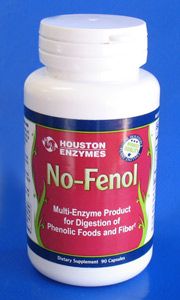
- Unique Formulation to Assist in Digestion of Phenolic Foods
- High Amounts of Xylanase and Cellulase Enzymes
- Phytase Present to Increase Availability of Minerals and Nutrients
No-Fenol was developed by Dr. Devin Houston, the founder of Houston Nutraceuticals (HNI), in response to requests for a product that would allow them to eat fruits and vegetables without the problems thought to be associated with some phenolic compounds. Initial responses from many indicate that No-Fenol can allow the addition of these foods to the diet without complications.
All plants contain some degree of phenolic compounds. The phenol structure itself is ubiquitous in nature, and is actually essential to many of life’s processes. Current thinking by many is that some have difficulty in the assimilation of phenolic compounds. The research literature indicates that some phenolic compounds are modified by the addition of carbohydrate groups to their structures, which may inhibit their crossing into cells and being metabolized. The current hypothesis for why No-Fenol may help is through the ability of the enzymes in this product to remove the carbohydrate groups from the phenols, thus allowing normal processing by the detoxification pathways. There is no evidence that No-Fenol directly modifies phenolic structures. Indeed, the success of No-Fenol in allowing the addition of phenolic foods back into the diet may result in a re-evaluation of the basis of the phenol “problem”.
Xylanase is the major component of No-Fenol, and is an enzyme used to breakdown the structural components of plant cell walls, which are primarily very complex carbohydrates. Xylanase is used in the juice industry to extract more juice from fruit pulp fibers. At least one reference indicates that polyphenolic compounds are actually increased by the presence of xylanase. Based on this reference and the fact that No-Fenol has allowed “phenol-sensitive” individuals to ingest phenolic foods, HNI now believes that the phenol issue is much more complex than previously thought, and may not be due so much to the presence of phenols as to the specific structure of these phenols.
Reported Side Effects
In some cases, stools were softer and less formed, which may be a result of the enzymes decreasing the viscosity of the intestinal contents, as noted in animal studies.
Contraindications for Enzyme Supplementation
This product may not be appropriate for those with known allergies to Aspergillus enzyme proteins, though non-specific mold allergies do not necessarily preclude use of fungal enzymes. Consult your medical doctor for further advice, and err on the side of caution. Those with known anaphylactic allergic reactions to fungal proteins should NOT ingest fungal-derived enzymes.
Suggested Dosage: ½ – 1 capsule with phenolic foods, but not necessarily with every meal. No-Fenol is suggested primarily for those with known intolerances to phenolic compounds. Some have found satisfactory results with once or twice per day dosing, indicating that optimal dosing may be dependent upon many factors. No upper limit has been established for enzyme dosing, and animal studies found no toxicity at dosing as high as 80,000 FXU per kilogram of body weight per day for 13 weeks.
Zyphenase™ is a trademark of Houston Nutraceuticals, Inc.
CereCalase™ is a trademark of National Enzyme Company.
Each capsule contains:
| Supplement Facts | ||
| Serving size | 1 Capsules | %DV |
| Servings per container | 90 | |
| Zyphenase™ enzyme blend | 288 mg | * |
| Xylanase | 32000 XU | * |
| CereCalase™ | 1500 MU | * |
| * Daily Value not established. | ||
| Other Ingredients: Vegetable cellulose, rice bran and water. | ||
This product contains NO yeast, gluten, soy protein, milk/dairy, corn, sodium, sugar, starch, artificial coloring, preservatives or flavoring.
These statements have not been evaluated by the FDA. This product is not intended to diagnose, cure, treat, or prevent any disease.
ShareJAN


About the Author: